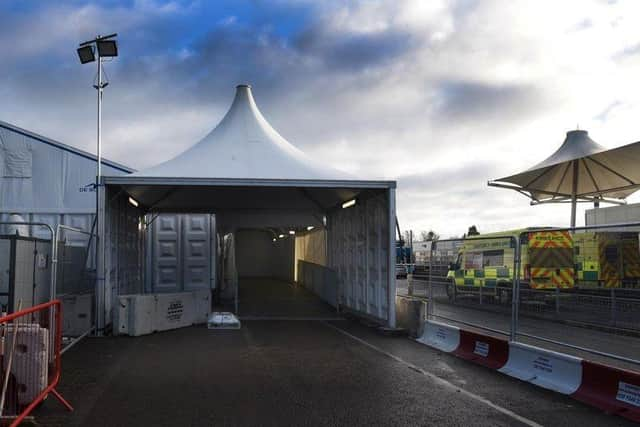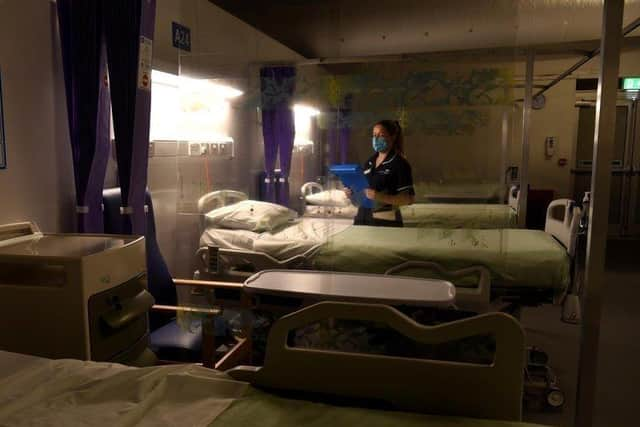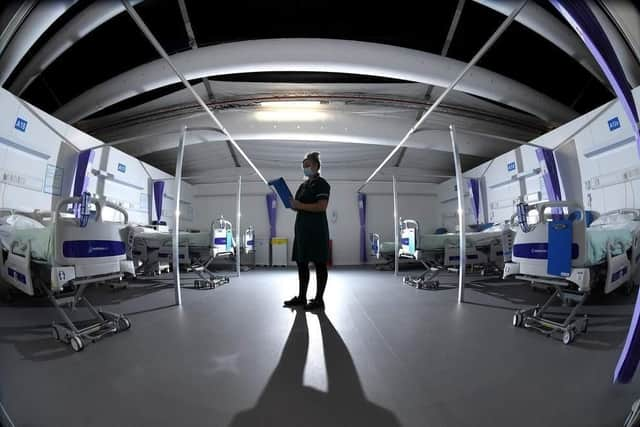Royal Preston’s Covid Nightingale Surge Hub will close this week
and live on Freeview channel 276
The hospital’s Nightingale Surge Hub was one of eight to be commissioned nationwide late last year as the first Omicron wave took hold.
The NHS established the facilities amidst concern that the rapid spread of the highly-transmissible variant could translate into a sudden increase in the number of people being hospitalised with the virus.
Advertisement
Hide AdAdvertisement
Hide AdThe Royal Preston’s Nightingale opened towards the end of January and the Post has been told that it was more well-used than any of its counterparts elsewhere - although not by the group of patients for whom it was initially intended.


As we revealed in February, Lancashire Teaching Hospitals NHS Foundation Trust ultimately opted to use the pop-up unit to house non-Covid patients who were no longer in need of acute care - and were typically waiting for support packages to enable them either to go back home or into a care.
At the time, LTH said that its Nightingale hub - which was the only one in the North West and was designed to support the entire region in the event of an Omicron-related rise in admissions - was helping to free up room at an under-pressure Royal Preston.
The trust said that the facility had increased the hospital's capacity to carry out pre-planned operations and better manage the discharge of patients.


Advertisement
Hide AdAdvertisement
Hide AdSpeaking ahead of the unit being taken down in the coming days, LTH chief executive Kevin McGee told the Post that it had been a “tremendous” resource - but that now was the time to remove it.
“We have had the most extensive use of the Nightingale of any trust in their country. From February onwards, we’ve had close to 50 patients every day in [the facility] - no other Nightingale has come close to that use.
“Whether it comes back, I don't know. I think it's right that it does come down now - we are going into the summer period and we’re also opening [a] new modular ward on the Chorley Hospital site, which will give us more capacity.
“Now we've had the experience of how we can use a Nightingale so successfully, we can mobilise very quickly, should it be necessary - so I wouldn't rule out using it again at some point in the future,” Mr. McGee said.


Advertisement
Hide AdAdvertisement
Hide AdThe eight Omicron-era Nightingales set up nationwide - which were named after the original Covid overspill facilities established when Covid first struck in 2020 - each had a theoretical capcity of 100 and cost a total of £10.6m to establish, the government confirmed earlier this year.
It was reported in early February that the Royal Preston’s was the only one to have been brought into operation at that point.
The Post asked NHS England for the individual price tag for the Preston Nightingale - which ultimately had the capacity for around 55 patients - and for confirmation of whether the other units elsewhere in the country were all eventually used, but no details were provided.
The first Omicron wave at the start of the year did result in a significant rise in the number of patients with Covid who were being treated at LTH facilities, with the figure peaking at 124 on 4th January, compared to 33 a month earlier.
Advertisement
Hide AdAdvertisement
Hide AdNot all of those testing positive will have been in hospital as a result of their Covid infection - with just over half being admitted for other reasons during a second Omicron wave in early spring, which peaked with 153 LTH patients having the virus on 12th April.
That figure was down to 34 as of 21st June, but a further Omicron-fuelled surge in cases is now setting in nationwide, driven by the BA4 and BA5 sub-variants.
According to estimates derived from the regular survey conducted by the Office for National Statistics, 1.7m people would have tested positive for Covid in the UK in the week to 18th June - that is equivalent to 1 in 35 of the population and a 23 percent increase on the previous seven-day period.
Meanwhile, as the Royal Preston prepares to dismantle its Nightingale hub - and eventually return the car park where it has stood at the front of the hospital to its normal use - Kevin McGee paid tribute to the staff who have run the facility.
Advertisement
Hide AdAdvertisement
Hide Ad“They have been heroic in terms of what they have done and how they have done it. There's still a lot of pressure on the NHS, Covid numbers in the last couple of weeks have gone up again - and staff are working really hard - and a massive thank you to each and every one of them.”
